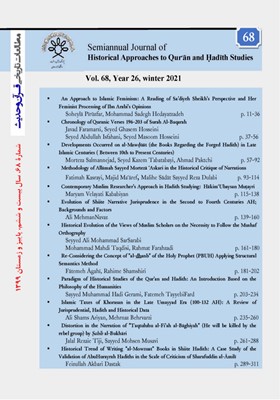Historical Evolution of the Views of Muslim Scholars on the Necessity to Follow the Mushaf Orthography
Subject Areas :Seyed Ali Mohammad Sarsarabi 1 , Mohammad Mahdi Taqdisi 2 , Rahmat Farahzadi 3
1 - PhD student in Theology and Islamic Studies, Yadegar Imam Khomeini Branch in Rey, Islamic Azad University, Tehran, Iran.
2 - Assistant Professor, Department of Theology and Islamic Studies, Yadegar Imam Khomeini Branch in Rey, Islamic Azad University, Tehran, Iran.
3 - Assistant Professor, Department of Theology and Islamic Studies, Yadegar Imam Khomeini Branch in Rey, Islamic Azad University, Tehran, Iran.
Keywords: Orthography, Mushaf orthography, Fixed orthography,
Abstract :
The Prophet's order to compile the Qur'an at the same time as its revelation is a matter agreed upon among the scholars of the sciences and history of the Qur'an; however, whether the form of writing the words was ordered by the Holy Prophet (PBUH) or after his death was determined by the companions and that the scribes of revelation wrote according to the usual method of writing the Arabic language, or not, is a matter of controversy. This raises the question of whether, in any case, it is necessary to follow the original writing system of the Holy Qur'an in later centuries, and whether the idea that the Qur'anic orthography is not subject to theorizing is correct or not. This article intends to provide a correct answer to the proposed questions by examining the historical course and careful analysis of the opinions of eminent scholars in this field. Based on the finding of this research, it is preferred to adhere to the original and ancient orthography of the Holy Quran in comparison with two other theories, one of which considers the orthography of the Qur'an necessary to be followed and another considers it obligatory to deviate from it.
_||_


